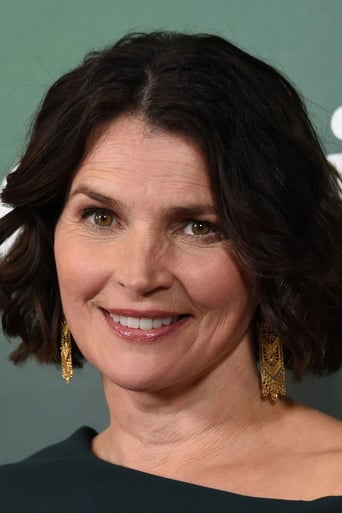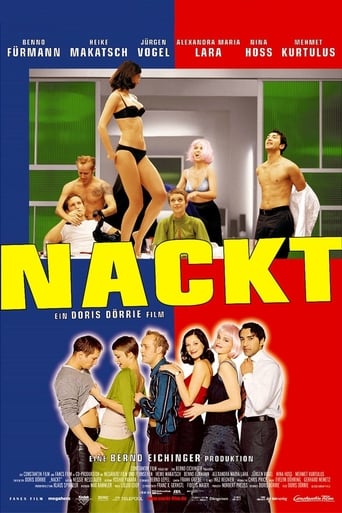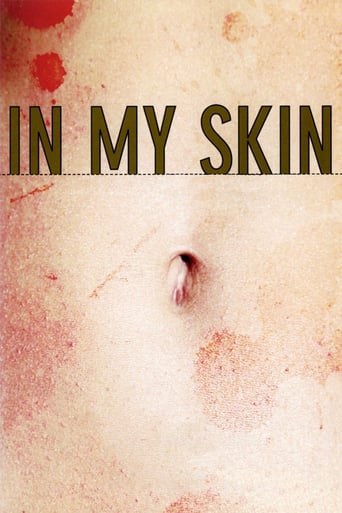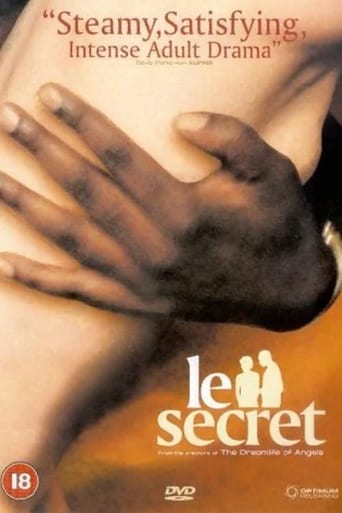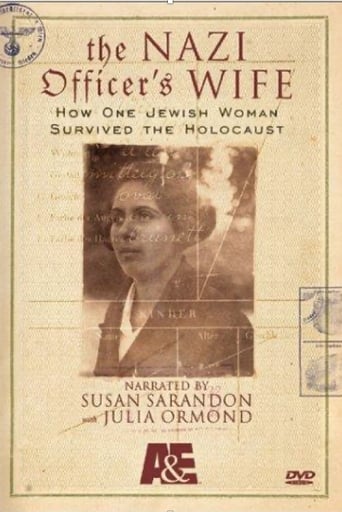

The Nazi Officer's Wife (2003)
In 1938 Edith Hahn was a Viennese law student - a "Christmas-tree Jew" with a gentile boyfriend. In 1942 she was living under an assumed name in Munich and married to Werner Vetter, a Nazi party member who was later drafted into the Wehrmacht. Based on Hahn's acclaimed memoir, "The Nazi Officer's Wife" is the riveting account of how she survived the Holocaust by posing as an Aryan hausfrau. Despite the risks, she kept painstaking records including real and falsified documents and photos of labor camps. These moving artifacts along with testimony from Hahn and her daughter bring this tale of survival resilience and redemption to life.
Watch Trailer
Cast
Similar titles

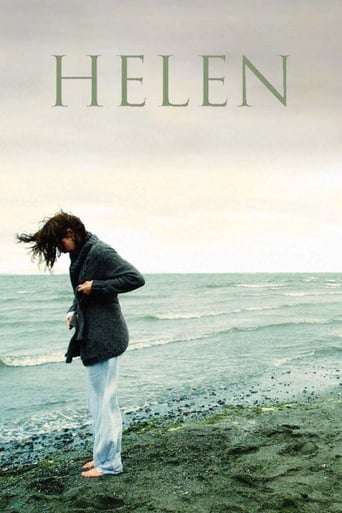

Reviews
Nice effects though.
I wanted to like it more than I actually did... But much of the humor totally escaped me and I walked out only mildly impressed.
This story has more twists and turns than a second-rate soap opera.
A lot of perfectly good film show their cards early, establish a unique premise and let the audience explore a topic at a leisurely pace, without much in terms of surprise. this film is not one of those films.
I tried! I tried 10 minutes and it was boring as can be, so I skipped ahead a little more and it was still boring. Skipped again and it was just as boring. This thing is narrated in one tone, one I've become familiar with from watching crappy documentaries like this one, a tone that tries to tug at your heart strings, so that instead of listening to the actual narration, I kept interpreting what Sarandon was trying to say: "This is so sad. We're not even going to make an effort to make this interesting because Holocaust! Who cares what the content of my narration is, just be sad because Holocaust!" The story itself seems interesting but I'll see if I can find a book about it rather than waste another hour and ten minutes of my life on this.
"The Nazi Officer's Wife" is a 2003 documentary about Edith Hahn Beer, a Jew who lived in Vienna when the Nazis took over in the '30s. Her sisters were sent to Palestine, her father died, and she was sent to a work camp. Her mother was sent to Minsk and died there, though it was some time before Edith learned what had happened to her.After the work camp, Edith was to be sent to Auschwitz, but she removed her Jewish star and eventually was helped to escape by a non-Jewish friend who surrendered her own identity papers, after claiming to the government that hers had been lost in a boat trip on the Danube. The friend was later honored for this, as she risked her life in doing so.Edith went to Munich and worked for the Red Cross, eventually meeting a Nazi who could not join the service because he was blind in one eye. They married and had a child.This is an amazing story of the horrible fear of living under the Nazis, how the Jews were stripped of their rights, and how Edith had to take on an Aryan identity in order to survive, something she obviously felt very guilty about doing. It is a fascinating documentary. I read up on her later on and learned that her diaries and letters were sold by Sotheby's for $169,000 and later donated to a Holocaust museum. At the time, Edith had cataracts, was in her eighties and broke. It was her wish to donate the papers, but as always in her life, she had to be practical.There are interviews with Edith, her daughter, and several school friends, as well as a lot of footage. Her letters and diaries are beautifully read by Julia Ormond, and Susan Sarandon provides narration.I have to take issue with the reviewer who claimed there were "credibility issues." There are no credibility issues. She was hardly the only Jew who took an Aryan identity. It is also true that Nazis helped Jewish friends escape (though this didn't happen to Edith, but the reviewer on this site said that no Nazi would ever help a Jew - many did). Also, the fact that the person who gave her ID papers to Edith was honored is another testament to the truth of the story.Additionally, her boyfriend, Pepi, whom she asked to burn her letters for his own safety, saved them instead and returned them in 1977, so there is excellent documentation since she was writing him from the labor camp. She also took photos during the whole period with a camera given to her by her father, and some of these photos were shown during the documentary. I doubt Sotheby's would have sold a bunch of fakes - the New York Times article I read said that all of Edith's papers were carefully studied.If there was some denial of how she lived afterward so that she didn't share much with her daughter, this is understandable and probably part of her survivor guilt. It's not a sin to survive - the sin is that anyone was persecuted. People do what they have to - look at the pianist Wladyslaw Szpilman and what he did to survive.This is a very compelling story and you can feel the fear rising as you watch it, it so entrenches you. Highly recommended.
Caroline McDermott Mrs. Eppley Honors English II 12 April 2013Edith Hahn Beer: the Nazi Officer's Wife, Harper Perennial, Copyright 2000, 305 pages, autobiographyThe Nazi Officer's Wife is an extremely honest and real portrayal of what life was like before and during the holocaust in Germany during World War II. Edith Hahn Beer explains her struggles and her perseverance and talks about the lies and complete fear she had to live through. Her recollections of her experiences in this book are not quite biased, and not quite passive, but merely tell her story and leaves it open to interpretation, assuming that most people would have the same view and emotions towards the things that she writes about. Her story is compelling, sad, emotional, but overall, a truthful portrayal of her life and her struggles.The book begins with Edith's early life in Germany, and how she was a bright student. She was social and outgoing, but was still intelligent enough to go to University as a girl in the 1920's.Her life was quickly changed when war and Anti-Semitism became rampant and she was put into a woman's labor camp. Her family members had to flee Germany, or were in labor camps. When she got out, her half Jewish boyfriend of many years, Pepi, found it too dangerous to be with her, and their relationship ended. Edith removed her Jewish yellow star and searched around the country for safe places to live where she would not be caught and put into a concentration camp. Edith was helped find safety with many friends, and even members of the Nazi party. With the help of Nazi's, Edith took on the new identity of an Aryan woman, Grete Denner. She then fell in love with and married a prominent Nazi official, who helped her keep her Jewish secret. Edith's husband was later captured by the Soviets, and she was bombed out of her house, but she survived with her child. Ultimately, Edith survived through multiple life threatening situations with her hope and perseverance. I felt that this book was a great and honest work of literature. It fulfilled its purpose to give a truthful portrayal of what life was like for a Jewish woman in Germany in the 1920's and 30's, and during the second World War. It was fairly easy to read, but did become confusing at parts with a all of the different German names and characters to remember. This book was also extremely interesting, because it was an angle of World War II and Anti-Semitism that I had never seen before. I was shocked that after all Edith had gone through to study law, she was not allowed to take her final test because she was Jewish. It really showed the unfairness and frustration of the whole situation in a new light for me. Edith does not have a set argument when telling her story, but is simply just telling her story, which allowed me as the reader to draw my own conclusions and have my own opinions about what she was telling. The greatest strength of this book I feel, is the extremely unique situation that Edith was put into, and also her complete honest storytelling. I would recommend this book to people interested in World War II or Anti-Semitism in Germany, and would want to see another angle or view of it.
We had seen many promos on A&E throughout the last week or so about this documentary. I have seen quite a few documentaries about World War 2 and the holocaust, but this particular one, to me, was quite personal.I am very happy that I never had to live through this ordeal and I could not even imagine what would be going through someone's brain to try and even fathom what was going on and how to survive.This particular lady, Edith Haan, had some luck plus some opportunities to survive the war. Tragically, most of her family didn't.She hid openly inside Germany under an assumed name, thanks to help which some of her friends gave to her, and eventually she married a Nazi Officer and remained married to him until after the war. The marriage produced one daughter (the only Jewish baby to be born during the war and survive, thanks to her mother).I have met survivors of the holocaust and one of the first things that they tell me is the powerful guilt they feel because they survived, where others didn't. They have one MAJOR problem of discussing their ordeals because of how powerful and all consuming this tragedy was.So this documentary shows the life, on a personal level, of Edith Haan, when she finally was able to talk about her life after the Germans invaded Austria in 1938.I don't think that we, as civilized human beings, have the right to judge any of her decisions or actions. We all survive in our own way.Let us hope and pray that this tragedy will never befall man ever again!!! Where man can live together with man peacefully and as the Bible says "beat their swords into plowshares".
